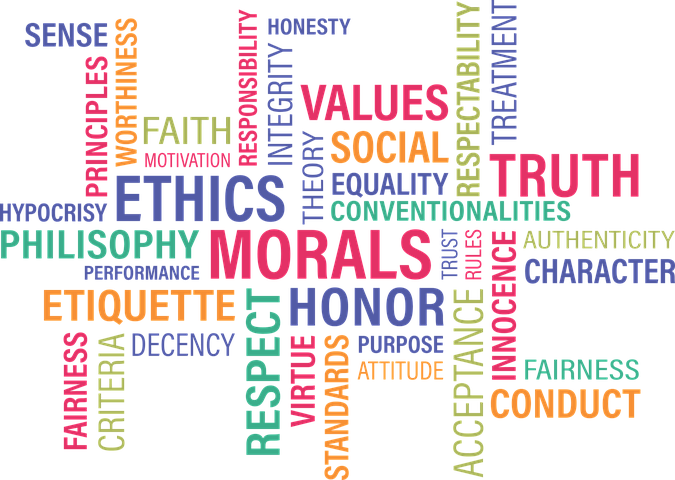
Last Thursday, I received notice that Sreejit from The Seekers Dungeon was re-starting his Dungeon Prompt series. I was intrigued by the topic for the week, Moral Authority. I began to think about what moral authority meant to me.
The next day, I read that the Trump Administration had 1) stopped a study of the health effects of a mining practice in Appalachia, 2) disbanded the federal advisory committee on climate change, and 3) decided that the Environmental Protection Agency would work on building partnerships rather than focusing on regulations and enforcement. I felt despair when I read that information. It occurred to me that I was seeing examples of what moral authority is NOT, at least in my world view.
I accept that President Trump has some authority over me because of the power of his position, but due to the things he says and does on nearly a daily basis, I do not believe that he has moral authority, or it least none that I will accept.
Since those were thoughts I had on the spot, I decided it was time for me to learn more about moral authority.
Wikipedia stated:
Moral authority is authority premised on principles, or fundamental truths, which are independent of written, or positive, laws. As such, moral authority necessitates the existence of and adherence to truth. Because truth does not change, the principles of moral authority are immutable or unchangeable, although as applied to individual circumstances the dictates of moral authority for action may vary due to the exigencies of human life. These principles, which can be of metaphysical and/or religious nature, are considered normative for behavior, whether they are or are not also embodied in written laws,[1] and even if the community is ignoring or violating them.[2] Therefore, the authoritativeness or force of moral authority is applied to the conscience of each individual, who is free to act according to or against its dictates.
Moral authority has thus also been defined as the “fundamental assumptions that guide our perceptions of the world”.[3]
Theodore Brown wrote:
Put the phrase “moral authority” into a Google search, and you will get back something over 670,000 hits. Clearly the expression gets used a lot. But what do people mean when they use it? Many people seem to think that it means the right to weigh in on discussions involving what to do about some tough issue. Other uses suggest that it is a measure of virtue; those who live exemplary lives have moral authority. Or, that one can gain moral authority by having been put through a trial: the John McCain effect. One simple definition is that moral authority is the capacity to convince others of how the world should be. This distinguishes it from expert or epistemic authority, which could be defined as the capacity to convince others of how the world is.
When I found the diagram at the top of this post, it occurred to me that reflecting on those positive and negative behaviors might help me identify those people who I think have moral authority. From that exploration, I came up with a list of behaviors that I think those who have moral authority have in common. In my mind, people with moral authority:
- love all beings in the world
- love and are committed to nature
- live lives of service
- speak the truth
- teach others to live in integrity
- teach others healthy principles of living
- teach others to love and respect one another
- value unity over division
- live lives that are true to their teachings, i.e. they walk their talk
As I pondered who the people were that I think have moral authority, Jesus, Amma, Martin Luther King, and Pope Francis came instantly to my mind. Amma is clearly the person whose moral authority has impacted my life the most.
I believe blind faith may come in an instant, but mature faith develops from experience. I have been in Amma’s presence for 28 years- watching her, learning from her and seeing the impact she has had on my life and the lives of my friends, family, and other devotees. I have no doubt that she has made a massive difference in the lives of millions of people the world over.
Many years ago, I wrote a song, and had a friend translate it into Malayalam, that in a way reflects my decision to accept Amma’s moral authority. I titled the song, Only for This I Pray.
This is an audiotape and lyrics of that song. Please pardon any pronunciation errors.
amma ende karangal ennum ninne sevikkatte
amma ende manass˘ mantrathāl nirayename
amma ende vākkukal ennum ninne pukazhthette
ende hridayam ānandam kond˘ nrittamādatte
ende sneham prakāshamāyi ennenum thilangatte
amma ende vishvāsam valarnnu kondirikkatte
ennenum ammayepole āyi varename
amma itinnu vendi mātram nyan prārthikkyunnu
Mother, may my hands be in service, my mind fill with mantra
May my voice forever sing your praise, my heart dance with joy
May my love shine ever brighter, my faith ever grow
Mother, may each day I become more like you, only for this I pray
Only for this I pray
That prayer is as true for me today as it was the day I wrote it.
